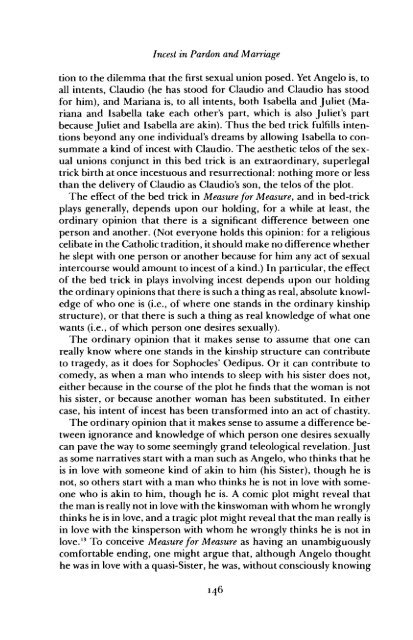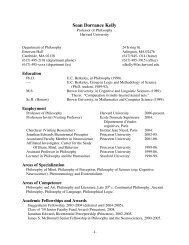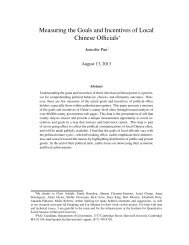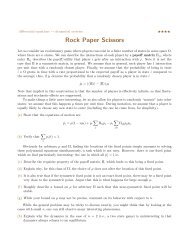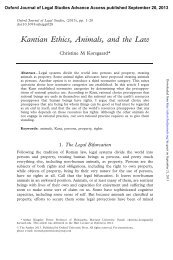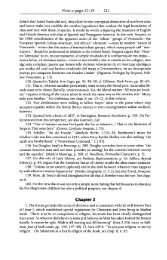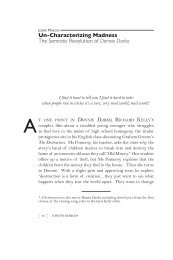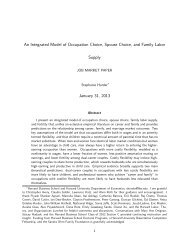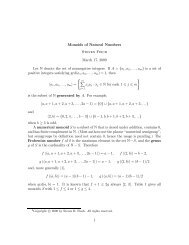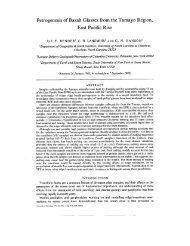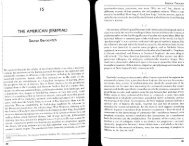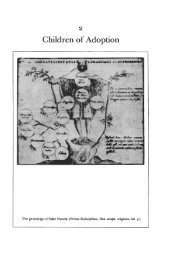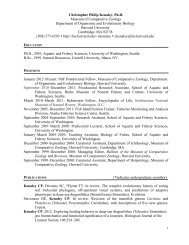Incest in Pardon and Marriage - People Fas Harvard
Incest in Pardon and Marriage - People Fas Harvard
Incest in Pardon and Marriage - People Fas Harvard
You also want an ePaper? Increase the reach of your titles
YUMPU automatically turns print PDFs into web optimized ePapers that Google loves.
<strong>Incest</strong> <strong>in</strong> <strong>Pardon</strong> <strong>and</strong> <strong>Marriage</strong><br />
tion to the dilemma that the first sexual union posed. Yet Angelo is, to<br />
all <strong>in</strong>tents, Claudio (he has stood for Claudio <strong>and</strong> Claudio has stood<br />
for him), <strong>and</strong> Mariana is, to all <strong>in</strong>tents, both Isabella <strong>and</strong> Juliet (Ma-<br />
riana <strong>and</strong> Isabella take each other's part, which is also Juliet's part<br />
because Juliet <strong>and</strong> Isabella are ak<strong>in</strong>). Thus the bed trick fulfills <strong>in</strong>ten-<br />
tions beyond any one <strong>in</strong>dividual's dreams by allow<strong>in</strong>g Isabella to con-<br />
summate a k<strong>in</strong>d of <strong>in</strong>cest with Claudio. The aesthetic telos of the sex-<br />
ual unions conjunct <strong>in</strong> this bed trick is an extraord<strong>in</strong>ary, superlegal<br />
trick birth at once <strong>in</strong>cestuous <strong>and</strong> resurrectional: noth<strong>in</strong>g more or less<br />
than the delivery of Claudio as Claudio's son, the telos of the plot.<br />
The effect of the bed trick <strong>in</strong> Measure for Measure, <strong>and</strong> <strong>in</strong> bed-trick<br />
plays generally, depends upon our hold<strong>in</strong>g, for a while at least, the<br />
ord<strong>in</strong>ary op<strong>in</strong>ion that there is a significant difference between one<br />
person <strong>and</strong> another. (Not everyone holds this op<strong>in</strong>ion: for a religious<br />
celibate <strong>in</strong> the Catholic tradition, it should make no difference whether<br />
he slept with one person or another because for him any act of sexual<br />
<strong>in</strong>tercourse would amount to <strong>in</strong>cest of a k<strong>in</strong>d.) In particular, the effect<br />
of the bed trick <strong>in</strong> plays <strong>in</strong>volv<strong>in</strong>g <strong>in</strong>cest depends upon our hold<strong>in</strong>g<br />
the ord<strong>in</strong>ary op<strong>in</strong>ions that there is such a th<strong>in</strong>g as real, absolute knowl-<br />
edge of who one is (i.e., of where one st<strong>and</strong>s <strong>in</strong> the ord<strong>in</strong>ary k<strong>in</strong>ship<br />
structure), or that there is such a th<strong>in</strong>g as real knowledge of what one<br />
wants (i.e., of which person one desires sexually).<br />
The ord<strong>in</strong>ary op<strong>in</strong>ion that it makes sense to assume that one can<br />
really know where one st<strong>and</strong>s <strong>in</strong> the k<strong>in</strong>ship structure can contribute<br />
to tragedy, as it does for Sophocles' Oedipus. Or it can contribute to<br />
comedy, as when a man who <strong>in</strong>tends to sleep with his sister does not,<br />
either because <strong>in</strong> the course of the plot he f<strong>in</strong>ds that the woman is not<br />
his sister, or because another woman has been substituted. In either<br />
case, his <strong>in</strong>tent of <strong>in</strong>cest has been transformed <strong>in</strong>to an act of chastity.<br />
The ord<strong>in</strong>ary op<strong>in</strong>ion that it makes sense to assume a difference be-<br />
tween ignorance <strong>and</strong> knowledge of which person one desires sexually<br />
can pave the way to some seem<strong>in</strong>gly gr<strong>and</strong> teleological revelation. Just<br />
as some narratives start with a man such as Angelo, who th<strong>in</strong>ks that he<br />
is <strong>in</strong> love with someone k<strong>in</strong>d of ak<strong>in</strong> to him (his Sister), though he is<br />
not, so others start with a man who th<strong>in</strong>ks he is not <strong>in</strong> love with some-<br />
one who is ak<strong>in</strong> to him, though he is. A comic plot might reveal that<br />
the man is really not <strong>in</strong> love with the k<strong>in</strong>swoman with whom he wrongly<br />
th<strong>in</strong>ks he is <strong>in</strong> love, <strong>and</strong> a tragic plot might reveal that the man really is<br />
<strong>in</strong> love with the k<strong>in</strong>sperson with whom he wrongly th<strong>in</strong>ks he is not <strong>in</strong><br />
love.I3 To conceive Measure for Measure as hav<strong>in</strong>g an unambiguously<br />
comfortable end<strong>in</strong>g, one might argue that, although Angelo thought<br />
he was <strong>in</strong> love with a quasi-Sister, he was, without consciously know<strong>in</strong>g


